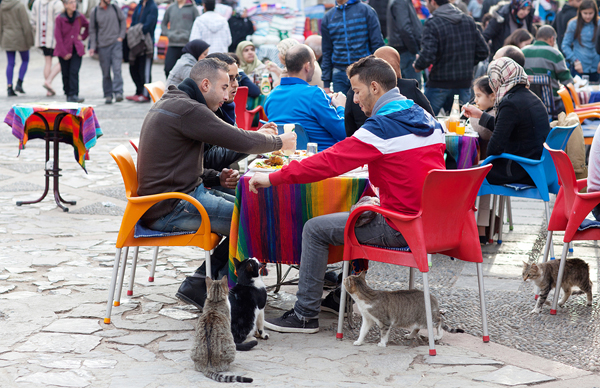Moving with a Pet to Morocco
Summary: Learn about moving with a pet to Morocco: what the requirements are, important vaccination information, what you can and cannot bring to Morocco, travel information and more.

Moving to Morocco with a pet involves a series of steps to ensure your furry friend can enter the country without any issues. It's essential to be aware of the vaccination and paperwork requirements, as well as any quarantine protocols that may apply. While having pets is not uncommon in Morocco, the presence of expat-owned pets is less frequent, and local attitudes towards pets can vary. In urban areas, pets are more commonly accepted, but in rural areas, they may be seen more as working animals than companions. This article will guide you through the process of bringing your pet to Morocco, detailing everything from documentation to settling in with your pet in a new country.
Can I bring my dog to Morocco?
Yes, you can bring your dog to Morocco, but you must comply with the country's import requirements. This includes having a valid rabies vaccination certificate and a veterinary health certificate. Your dog must be vaccinated against rabies at least 21 days before travel but not more than 12 months prior to entering the country. Additionally, some breeds may be subject to specific regulations, so it's important to check for any breed-specific restrictions before planning your move.
Can I bring my cat to Morocco?
Similar to dogs, cats are also allowed entry into Morocco. The requirements for bringing a cat into the country include a valid rabies vaccination certificate and a veterinary health certificate. The rabies vaccination must be administered no less than 21 days and no more than 12 months before entering Morocco. It's crucial to ensure all documentation is accurate and up-to-date to avoid any complications upon arrival.
Pets that are Prohibited from Coming into Morocco
Morocco does not have a specific list of prohibited pets, but it's important to note that exotic animals and wildlife may be subject to international and local regulations. It's advisable to contact the Moroccan Embassy or Consulate for the most current information regarding the importation of non-traditional pets. Generally, common domestic pets like dogs and cats are permitted with the proper documentation.
How do I bring my pet to Morocco?
To bring your pet to Morocco, you must ensure all required documentation is in order. This includes a valid rabies vaccination certificate, a veterinary health certificate issued within ten days of travel, and proof of ownership. There is no mandatory quarantine for pets arriving in Morocco as long as they meet the health requirements. However, pets may be subject to inspection upon arrival. It's recommended to have all documents translated into French or Arabic to facilitate the process. Additionally, make sure to check with your airline for any specific travel requirements they may have for transporting pets.
Upon Arriving in Morocco
After your pet has arrived in Morocco, there are a few steps you should take to ensure their well-being and compliance with local regulations. While there is no formal pet licensing requirement in Morocco, it's a good idea to register your pet with a local veterinarian for regular check-ups and any necessary vaccinations. Finding a veterinarian can be done through recommendations from other expats or by searching online for vet clinics in your area. While dog parks are not as common in Morocco as they may be in other countries, there are still places where you can take your dog for exercise. It's important to note that attitudes towards dogs can vary, with some people being wary, so always keep your dog on a leash in public spaces. Cats are generally more accepted, especially if they are kept indoors. As you settle in, take the time to understand and respect the local culture and customs regarding pets to ensure a harmonious experience for you, your pet, and your new community.
About the Author
 Betsy Burlingame is the Founder and President of Expat Exchange and is one of the Founders of Digital Nomad Exchange. She launched Expat Exchange in 1997 as her Master's thesis project at NYU. Prior to Expat Exchange, Betsy worked at AT&T in International
and Mass Market Marketing. She graduated from Ohio Wesleyan University
with a BA in International Business and German.
Betsy Burlingame is the Founder and President of Expat Exchange and is one of the Founders of Digital Nomad Exchange. She launched Expat Exchange in 1997 as her Master's thesis project at NYU. Prior to Expat Exchange, Betsy worked at AT&T in International
and Mass Market Marketing. She graduated from Ohio Wesleyan University
with a BA in International Business and German.
Some of Betsy's articles include 12 Best Places to Live in Portugal, 7 Best Places to Live in Panama and 12 Things to Know Before Moving to the Dominican Republic. Betsy loves to travel and spend time with her family. Connect with Betsy on LinkedIn.
Additional Information:
- Morocco Guide
- Healthcare & Health Insurance in Morocco
- Members Talk about Healthcare & Health Insurance in Morocco
- Best Places to Live in Morocco
- Real Estate in Morocco
- Guide to Real Estate in Morocco
- Pros & Cons of Living in Morocco
- Cost of Living in Morocco
- How to Enroll Your Children in School in Morocco
- Educational System in Morocco
- 10 Things to Know Before Moving to Morocco
- Buying a Home in Morocco
- Pros and Cons of Living in Morocco 2025
- 2025 Guide to Moving to Morocco




